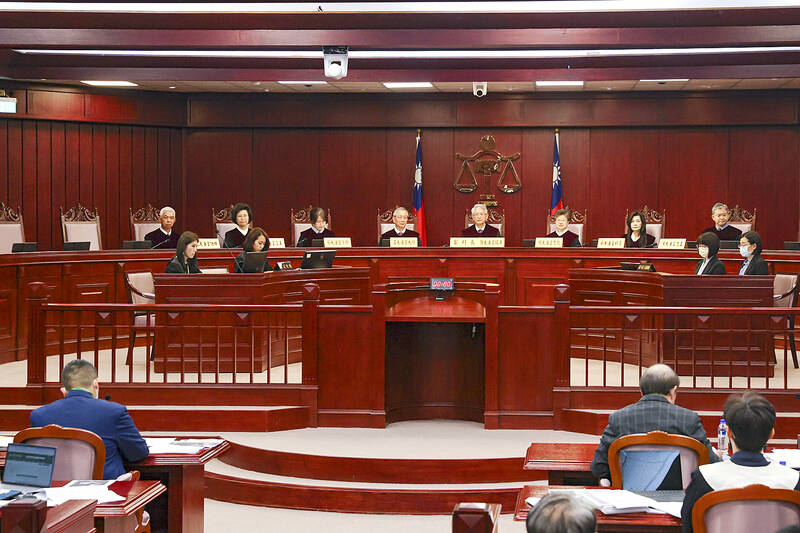The Constitutional Court yesterday heard arguments on controversial changes to the Constitutional Court Procedure Act (憲法訴訟法) passed by the legislature last year.
Opposition party lawmakers on Dec. 12 last year passed amendments to the act stipulating that the president must submit nominations to fill court vacancies within two months if the number of justices falls below 15, and that it requires at least 10 justices on the court — which normally has 15 members — to hear a case, and at least nine justices to back any unconstitutional ruling.
The Democratic Progressive Party (DPP) caucus requested an injunction and constitutional interpretation of the amendments earlier this year.

Photo: CNA
The Constitutional Court invited representatives of the petitioner and the legislature, as well as experts to state their opinions.
DPP caucus whip Ker Chien-ming (柯建銘) and caucus chief executive Rosalia Wu (吳思瑤) attended on behalf of the petitioner, while Taiwan People’s Party Chairman Huang Kuo-chang (黃國昌) and Chinese Nationalist Party (KMT) Legislator Wu Tsung-hsien (吳宗憲) represented the legislature.
Ker and Wu said the passage of the amendments lacked discussion and was achieved through a non-recorded show-of-hands vote.
There were many serious legislative defects and the review process was reduced to majoritarian oppression that might be unconstitutional, they said.
The amendments infringed upon the core of judicial power protected by the Constitution and contravened the principle of the separation of powers, likely handicapping the operation of the Constitutional Court or even paralyzing it, the petitioners said.
Huang and Wu said they view a constitutional interpretation of the amendments as “judicial interference with the legislature’s parliamentary procedures” to be in contravention of the principle of the separation of powers.
The legislature’s autonomy and power of decision over internal affairs should be fully respected by judicial agencies, including the constitutional interpretation authority, as long as it does not contravene the Constitution, they said.
Endless controversies would ensue if the case set a precedent that allows judicial or other agencies to question or interfere with the legislature’s internal operations and instruct it on how to interpret its internal statutes or procedures, they said.
Wu in his remarks challenged the legitimacy of the hearing, stating that not enough justices were present.
The court should not extend its hand into politics, particularly as the amendments do not have major defects and should not be subject to constitutional review, he said, calling on the petitioner not to tarnish the justices’ reputation by dragging them into a political dispute.

The Ministry of Education (MOE) is to launch a new program to encourage international students to stay in Taiwan and explore job opportunities here after graduation, Deputy Minister of Education Yeh Ping-cheng (葉丙成) said on Friday. The government would provide full scholarships for international students to further their studies for two years in Taiwan, so those who want to pursue a master’s degree can consider applying for the program, he said. The fields included are science, technology, engineering, mathematics, semiconductors and finance, Yeh added. The program, called “Intense 2+2,” would also assist international students who completed the two years of further studies in

Former president Tsai Ing-wen (蔡英文) departed for Europe on Friday night, with planned stops in Lithuania and Denmark. Tsai arrived at Taiwan Taoyuan International Airport on Friday night, but did not speak to reporters before departing. Tsai wrote on social media later that the purpose of the trip was to reaffirm the commitment of Taiwanese to working with democratic allies to promote regional security and stability, upholding freedom and democracy, and defending their homeland. She also expressed hope that through joint efforts, Taiwan and Europe would continue to be partners building up economic resilience on the global stage. The former president was to first

Taiwan will now have four additional national holidays after the Legislative Yuan passed an amendment today, which also made Labor Day a national holiday for all sectors. The Chinese Nationalist Party (KMT) and Taiwan People’s Party (TPP) used their majority in the Legislative Yuan to pass the amendment to the Act on Implementing Memorial Days and State Holidays (紀念日及節日實施辦法), which the parties jointly proposed, in its third and final reading today. The legislature passed the bill to amend the act, which is currently enforced administratively, raising it to the legal level. The new legislation recognizes Confucius’ birthday on Sept. 28, the

MORE NEEDED: Recall drives against legislators in Miaoli’s two districts and Hsinchu’s second district were still a few thousand signatures short of the second-stage threshold Campaigners aiming to recall Chinese Nationalist Party (KMT) legislators yesterday said they expect success in 30 out of 35 districts where drives have passed the second-stage threshold, which would mark a record number of recall votes held at once. Hsinchu County recall campaigners yesterday announced that they reached the second-stage threshold in the recall effort against Legislator Lin Szu-ming (林思銘). A total of 26,414 signatures have been gathered over the past two months, surpassing the 10 percent threshold of 23,287 in Hsinchu County’s second electoral district, chief campaigner Hsieh Ting-ting (謝婷婷) said. “Our target is to gather an additional 1,500 signatures to reach